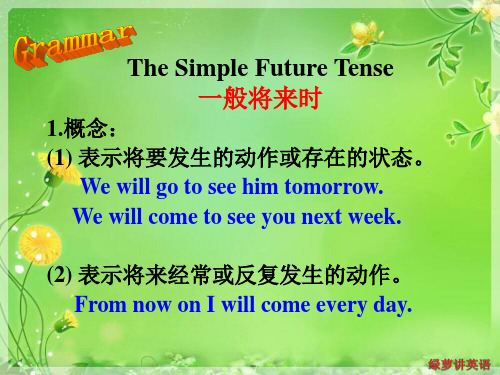一般将来时will的用法课件
合集下载
一般将来时will的用法课件

5.My dream school will have big classrooms and libraries.
6.Students will talk to their teachers on the computers.
7.Will there be schools in the future?
6.The birds won`t fly away to the south when the weather turns cold.
7.There will be a strong wind soon.
8.I will not tell it to him.
9.I think it will be very hot in Beijing next summer.
学习交流PPT
8
Functional Practise:
1.Ihope that you__ a good time this evening. C
A.have B.are having C.will have D.has
2.Look at those big black clouds. It __rain.Let`s hurry. D
No, there won`t.
8.We will use the Internet to study at home.
学习交流PPT
13
1. 明天不用上课。
2. Thewriell__b_e_ __n_o_ ____ class tomorrow. 2. 也许在100年后人们将活到200岁。
3. Ma_y_b_e__ peoplew_il_l__li_v_e__to___b_e___ 200 years old 4. in____ 100 years. 3. 许多女孩子喜欢养宠物。
6.Students will talk to their teachers on the computers.
7.Will there be schools in the future?
6.The birds won`t fly away to the south when the weather turns cold.
7.There will be a strong wind soon.
8.I will not tell it to him.
9.I think it will be very hot in Beijing next summer.
学习交流PPT
8
Functional Practise:
1.Ihope that you__ a good time this evening. C
A.have B.are having C.will have D.has
2.Look at those big black clouds. It __rain.Let`s hurry. D
No, there won`t.
8.We will use the Internet to study at home.
学习交流PPT
13
1. 明天不用上课。
2. Thewriell__b_e_ __n_o_ ____ class tomorrow. 2. 也许在100年后人们将活到200岁。
3. Ma_y_b_e__ peoplew_il_l__li_v_e__to___b_e___ 200 years old 4. in____ 100 years. 3. 许多女孩子喜欢养宠物。
最新一般将来时课件will的用法课件ppt

“be going to+动词原形”表示一个事先考虑 好的意图,相当于“打算、计划、准备”,而 will则表示未经事先考虑的意图。
Functional Practise:
1.Ihope that you__ a good time this evening. C
A.have B.are having C.will have D.has
jobs.
dull jobs.
Will he do dull Yes, he will.
jobs?
No ,he won`t.
There will be a There won`t be Will there be a Yes,there will. computer in it. a computer in it. compuer in it. No,there won`t.
一般将来时课件will的用法
我们除了用“be going to+动词原形” 可以表示一般将来时外, 我们还可以用“will+ 动词原形”来表示一般 将来时.
一般将来时的主要用法:
1、表示将来某一时刻的动作或状态: We will come to see you the day after tomorrow. There will be a wonderful show next week.
will句式总结:
肯定
否定
一般疑问 回答
I will have
I won`t have Will I have
Yes,I will.
many presents. many presents. many presents? No,I won`t.
He will do dull He won`t do
Functional Practise:
1.Ihope that you__ a good time this evening. C
A.have B.are having C.will have D.has
jobs.
dull jobs.
Will he do dull Yes, he will.
jobs?
No ,he won`t.
There will be a There won`t be Will there be a Yes,there will. computer in it. a computer in it. compuer in it. No,there won`t.
一般将来时课件will的用法
我们除了用“be going to+动词原形” 可以表示一般将来时外, 我们还可以用“will+ 动词原形”来表示一般 将来时.
一般将来时的主要用法:
1、表示将来某一时刻的动作或状态: We will come to see you the day after tomorrow. There will be a wonderful show next week.
will句式总结:
肯定
否定
一般疑问 回答
I will have
I won`t have Will I have
Yes,I will.
many presents. many presents. many presents? No,I won`t.
He will do dull He won`t do
《Will一般将来时》课件

05
练习与巩固
选择题
总结词
考查知识点掌握程度
题目1
Will you _____ a movie tonight?
题目2
I _____ go to the park tomorrow.
填空题
总结词
01
检验语言运用能力
题目1
02
He _____ (not go) to the zoo next week.
例子
I think the stock market will rise next year.(我认为明年股市会上涨。)
表示意图
总结词
使用will表示个人的意图或意愿 ,通常与未来的行动相关。
详细描述
当想要表达个人的意图或计划在 未来做某事时,可以使用will的 一般将来时形式。例如,“I will
例句展示
通过多个例句展示了will在 各种情境下的用法。
练习与巩固
提供了针对will用法的练习 题,帮助学生巩固所学知 识。
学习心得分享
1 2
对will的理解加深
通过课件的学习,学生对will的用法有了更深入 的理解。
对英语时态的掌握
在学习will的同时,学生对英语时态有了更全面 的认识。
3
对英语学习的兴趣提升
will help you if you need it.”(如果你需要,我会帮助你。)
03
will一般将来时的用法详解
表示预测
总结词
使用will表示对未来的预测,通常基于当前的情况或事实。
详细描述
当想要表达对未来的预测或推测时,可以使用will的一般将来时形式。例如,“If it's sunny today, the weather forecast says it will be hot tomorrow.”(如果今天天气晴 朗,天气预报称明天会很热。)
一般将来时课件(PPT)

“be able to”表示将来有能力做某 事时,使用一般将来时形式,例如“I will be able to help you”。
情态动词如“can”、“may”、 “must”等,在一般将来时中通常直 接加动词原形,例如“I can swim”。
03
一般将来时在句子中的运用
陈述句中的使用
表示将要发生的动作或存在的状态
纠正方法
应使用正确的将来时形式,如 "He will go to the park tomorrow." 或 "He is going to the park tomorrow."
忽略动词变化规则
错误示例
They will play football in the future.(忽略了动词play在将来时中的变化)
纠正方法
在将来时中,应使用正确的助动词或情态动词形式,如 "I will be able to help you with your homework." 或 "I can help you with your homework."
错误示例
He will must finish his work before leaving.(错误地使 用了情态动词must)
作用
用于表示未来的计划、打算、预测、 假设等。
常见表达形式
will + 动词原形
表示将来的动作或状态,如“I will go to the park tomorrow.”(我明天将去公园。)
be going to + 动词原形
表示计划、打算或即将发生的动作,如“I am going to study hard this semester.”(我这 学期打算努力学习。)
初中英语一般将来时will和be going to讲解课件

句型:特殊疑问词+一般疑问句 -How are they going to school tomorrow? -By bike. -What is he going to do next Sunday? -He is going to read books. -When are you going to buy a new bike? -Tomorrow.
going to, 而多用will。 如:
If any beasts comes at you, I'll stay with you and help you.
1.Bob and I _w__il_l_m__a_tc_h__(watch) an action movie tomorrow.
2.We __w__il_l _b_e____(be) able to go to space in the future.
时间状语:
tomorrow 明天
next week 下周
next month 下个月 next year 明天
before不久
soon 不久
the day after tomorrow 后天
the year after next 后年
the week after next 下下周
基本句型: 肯定句: 主语 + will +v. 原形 否定句: 主语 + will +not + v.原形 一般疑问句: will +主语 + v.原形
3.The childrenw_i_ll_d_i_s_cu__ss__(discuss) the plan after school.
He is seriously ill. He is going to die. He will be twenty years old.
going to, 而多用will。 如:
If any beasts comes at you, I'll stay with you and help you.
1.Bob and I _w__il_l_m__a_tc_h__(watch) an action movie tomorrow.
2.We __w__il_l _b_e____(be) able to go to space in the future.
时间状语:
tomorrow 明天
next week 下周
next month 下个月 next year 明天
before不久
soon 不久
the day after tomorrow 后天
the year after next 后年
the week after next 下下周
基本句型: 肯定句: 主语 + will +v. 原形 否定句: 主语 + will +not + v.原形 一般疑问句: will +主语 + v.原形
3.The childrenw_i_ll_d_i_s_cu__ss__(discuss) the plan after school.
He is seriously ill. He is going to die. He will be twenty years old.
一般将来时(8张PPT)初中英语专项复习课件

肯定句:主语+ will +do+其他 People will have robots in their homes. 否定句:主语+ will not /won't+do+其他 People will not/won’t have robots in their 一般疑问句:Will+主语+do+其他? 肯定回答:Yes, they will. 否定回答:No, they won’t. Will people have robots in their homes?
homes.
2.而be going to +do通常用来谈论在一个较近的未来将要发生的计 划中的或是有可能发生的事。如:
I am going to visit us next month.(在一个较近的未来将要发生 的计划中的事)
It is so cloudy. I think it’s going to rain. (有可能发生的事)
一般将来时
初中英语专项复习
一、一般将来时的意义: 用来描述一个即将要发生的动作;谈论未来的计划和打算。
二、一般将来时的基本结构: will/shall+动词原形
be going to+动词原形
常见时间状语:
next Tuesday next week the coming Sunday next year this afternoon
tomorrow tonight in a few minutes in the future in five years
三、一般将来时
1.will 用于一切人称,shall只用于第一人称(I/we)。但现代英语倾向 于所有人称都使用will而不用shall。will/shall + do通常用来谈论未 来会发生的事或是正在制定的计划。 It will rain this afternoon.(未来发生) I will take an umbrella with me.(计划)
《Will一般将来时》课件

1 Positive
主语 + will + 动词
2 N eg ative
主语 + will not + 动词
3 Question
Will + 主语 + 动词
一般将来时的用法
表达意愿
我将会去参加明天的会 议。
预测未来
明天会下雨。
提出建议
你应该明天早点休息。
例句和练习
1
例句
明天我将和朋友去看电影。
例句
意愿、预测、建议等
技巧
表达自信、使用时间表达、 多练习
使用一般将来时的技巧
Be confident
积极表达信心和决心。
Use tim e ex p res s io n s
明天、将来、下个星期 等词汇可以增强时态的 表达。
Practice with exercises
多做一些练习可以更好 地掌握一般将来时的用 法。
总结和要点
构成
will + 动词
用法
2
他明天不会来上班。
3
练习
请用一般将来时造句:
明天我们将去旅行。
注意事项和常见错误
1 D on't forg et
the subject
错误:Will go to the party.
正确:I will go to the party.
2 D on't use
c o n trac tio n s in form al writing
错误:I'll finish it tomorrow.
正确:I will finish it tomorrow.
《一般将来时》课件

be going to+动词原形
结构
主语+be going to+动词原形+其他 成分
例子
We are going to meet at the train station at 5:00.(我们计划在5点钟 在火车站见面。)
含义
表示计划或安排将来要发生的动作或 状态
用现在进行时表示
结构
主语+be+动词现在分词+ 其他成分
一般将来时可以用来表示对未来事件的预见或推测,通常与时间状语连用,如“in the future”、 “next year”等。例如,“It will rain tomorrow.”(明天会下雨。)
表示意图、打算或希望
总结词
表示个人的意图、打算或意图、打算或希望,通常与 表示意图的动词连用,如“plan”、“intend”、“hope” 等。例如,“I will visit my grandparents next week.”( 我打算下周去看望我的祖父母。)
含义
表示将来某个时间正在进 行的动作或状态
例子
He is coming here next week.(他下周将会来这 里。)
用一般现在时表示
结构
主语+动词原形+其他成分
含义
表示将来某个时间经常发生的动作或状态
例子
I do my homework every day.(我每天都会做作业。)
03
一般将来时的肯定句、否定句和 疑问句
感谢观看
基本构成
will + 动词原形
疑问句形式
Will + 主语 + 动词原形
否定句形式
- 1、下载文档前请自行甄别文档内容的完整性,平台不提供额外的编辑、内容补充、找答案等附加服务。
- 2、"仅部分预览"的文档,不可在线预览部分如存在完整性等问题,可反馈申请退款(可完整预览的文档不适用该条件!)。
- 3、如文档侵犯您的权益,请联系客服反馈,我们会尽快为您处理(人工客服工作时间:9:00-18:30)。
学习交流PPT
8
Functional Practise:
1.Ihope that you__ a good time this evening. C
A.have B.are having C.will have D.has
2.Look at those big black clouds. It __rain.Let`s hurry. D
6.The birds won`t fly away to the south when the weather turns cold.
7.There will be a strong wind soon.
8.I will not tell it to him.
9.I think it will be very hot in Beijing next summer.
10.He will use his pen and his calculator.
11.Will there be heavy rain and strong winds?
学习交流PPT
6
will句式总结:
肯定
否定
一般疑问
回答
I will have
I won`t have Will I have
Yes, there will. / No, there won’t.
注意:在口语中,所学习有交流P人PT 称都可以用will.、表示将来某一时刻的动作或状态: We will come to see you the day after tomorrow. There will be a wonderful show next week.
“主谓(宾)句型”的一般将来时:
肯定句:主语+ will +动词原形+(宾语)+其他
Some day people will go to the moon .
否定句:在will 的后面加not即可。will not 可缩写为 won’t
They won’t use books .
一般疑问句:把will 提到句子主语之前,结尾变问号。
学习交流PPT
7
一般将来时两种基本句式的区别:
在初中阶段来讲,”be going to+动词原形”和 “will+动词原形”这两种表示将来时态的结构没什么区 别。但在现代英语中,特别是在口语中,表示将来时 多用“be going to+动词原形”这一形式。另外他们主
要区别在于“be going to+动词原形”表示一个事先考 虑好的意图,相当于“打算、计划、准备”,而will则 表示未经事先考虑的意图。
A.must B.will
C.would
D.is going to
注意:will与be going to的区别,be going to可以表示明显将要发生的情况.
3.There__ a basketball match this afternoon. B
A.will have B.will be
C.has
The Simple Future Tense
一般将来时
学习交流PPT
1
我们除了用“be going to+动词原形” 可以表示一般将来时外,
我们还可以用“will+动 词原形”来表示一般将
来时.
学习交流PPT
2
will 引导的一般将来时:表示将来发生的动作或存在的状态, 最基本的结构:will + 动词原形
[注意]:无论后面加单数名词或复数形式,be都必须用原形。
There will be only one country.
否定句:在will后面加not.
There won’t be only one country.
一般疑问句:把will提到there之前。
Will there be only one country?
D.have
4. We__ to the park if it is fine tomorrow. A
A.will go B.go
C.goes
D. to go
学习交流PPT
9
Functional Practise:
Yes,I will.
many presents. many presents. many presents? No,I won`t.
He will do dull He won`t do
jobs.
dull jobs.
Will he do dull Yes, he will.
jobs?
No ,he won`t.
2、表示将来某一段时间内经常的动作或状态: The students will come and work in the lab once a
week. We will come and work in this factory every year.
学习交流PPT
5
例句:
1.I will call you this evening.
Will students go to school in the future ?
特殊疑问句:特殊疑问词+will +主语+动词原形+其他?
What will your学d习r交e流aPPmT school have ?
3
“There be”句型的一般将来时
肯定句: There will be +名词+其他成份
There will be a There won`t be Will there be a Yes,there will. computer in it. a computer in it. compuer in it. No,there won`t.
They will do They won`t do Will they do Yes,they will. heavy work. heavy work. heavy work? No,they won`t.
2.Students will use computers to learn in the future.
3.He will help his sister with her lessons.
4.We won`t be free(空闲的) this afternoon.
5.She will not listen to me.
